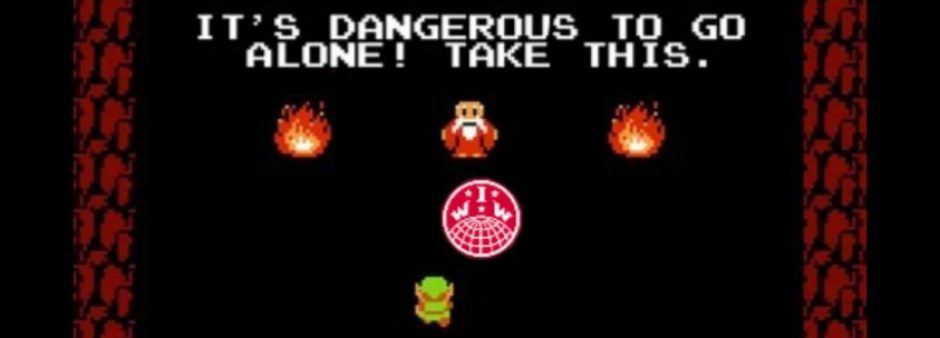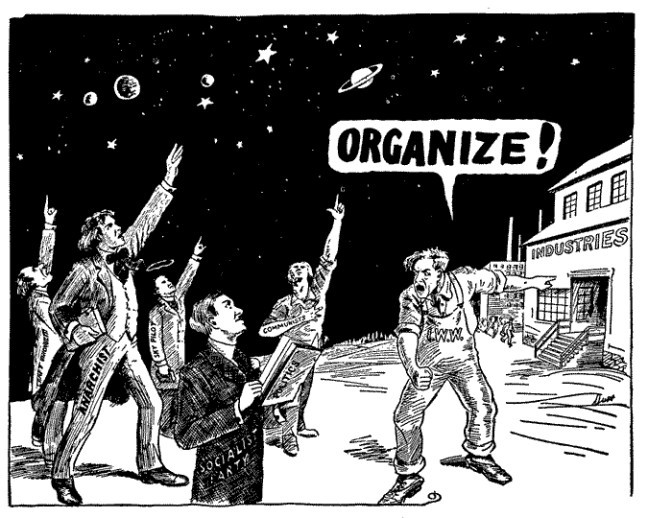
why join the IWW?
“If one man has a dollar he didn’t work for, some other man worked for a dollar he didn’t get.”
William D. “Big Bill” Haywood (founding member of the IWW)
It does not take long to figure out that workers and their employers do not have the same interests. Workers want shorter hours, higher pay and better benefits. We want our work to be less boring, less dangerous and less destructive to the environment. We want more control over how we produce goods and provide services. We want meaningful work that contributes to our communities and world.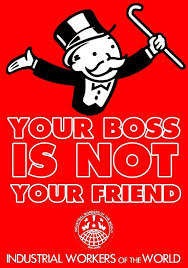
Our employers, in contrast, want us to work longer, harder, faster and cheaper. They want fewer safety and environmental regulations, and they demand absolute control over all decisions, work schedules, speech and actions in the workplace.
The easiest way to stand up for each other in our workplaces and communities and the easiest way to improve our working conditions is to join a union. That is why employers fight so hard and spend so much money 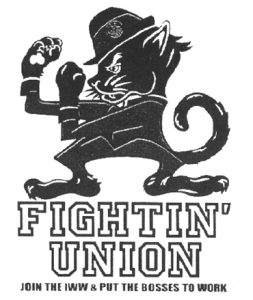 to keep unions out of their workplaces. Workers with unions generally have higher pay and job security, better benefits and fewer scheduling problems. More pay equals fewer hours at work and more hours for enjoying the good things in life. Union workplaces are safer and have less harassment, discrimination and favoritism. This is because a union gives workers the power to make workplace decisions. The less we let our employers make all of the decisions, the better our lives and communities will be. Unions also provide mutual aid and community. This means assistance with problems at work, but it could also mean help with a community project or fighting a landlord.
to keep unions out of their workplaces. Workers with unions generally have higher pay and job security, better benefits and fewer scheduling problems. More pay equals fewer hours at work and more hours for enjoying the good things in life. Union workplaces are safer and have less harassment, discrimination and favoritism. This is because a union gives workers the power to make workplace decisions. The less we let our employers make all of the decisions, the better our lives and communities will be. Unions also provide mutual aid and community. This means assistance with problems at work, but it could also mean help with a community project or fighting a landlord.
“If the workers are organized, all they have to do is to put their hands in their pockets and they have got the capitalist class whipped.”
William D. “Big Bill” Haywood (founding member of the IWW)
Tired of unions who are in friendly terms with management, and try to manipulate you, while you do not get a say in any decision? Great! The IWW is a fighting union, with no aspirations to partner up with employers or the government. Direct action, including strikes of every kind, have always been primary means to promote the interests of workers, and are to this day the main tools in the IWW’s toolbox. Collective bargaining, signing agreements and getting official recognition – the only methods the bureaucratic major unions are c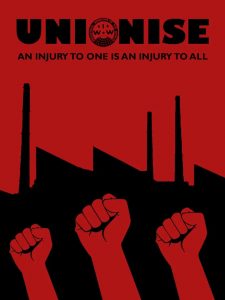 omfortable using – are not the priority, and are only used when they serve the best interest of the members, who make all the decisions. Are you are a member of any other union? No problem! You can still join the IWW; in fact, Wobblies are encouraged to be active members of other trade unions. Are you worried about how your financial contributions are managed? No need! In addition to having extremely low dues, based on individual financial situation, the IWW informs you of every single transaction they involved themselves with. Moreover, you can be sure that the union will always use its funds to support its members; a recent example of such a support, were the difficult days of the first Covid-19 outbreak, when the IWW created a solidarity fund which supported members that lost their jobs in countries all around the world. Finally, are you often moving from country to country? Good news! There are active IWW branches in the United States, Canada, Australia, New Zealand, the United Kingdom, Ireland, Iceland, Germany, Switzerland, Belgium and Greece, and there is a Wobbly presence in many other countries, including Latvia, India, the Philippines, Turkey, France, Italy and Cyprus.
omfortable using – are not the priority, and are only used when they serve the best interest of the members, who make all the decisions. Are you are a member of any other union? No problem! You can still join the IWW; in fact, Wobblies are encouraged to be active members of other trade unions. Are you worried about how your financial contributions are managed? No need! In addition to having extremely low dues, based on individual financial situation, the IWW informs you of every single transaction they involved themselves with. Moreover, you can be sure that the union will always use its funds to support its members; a recent example of such a support, were the difficult days of the first Covid-19 outbreak, when the IWW created a solidarity fund which supported members that lost their jobs in countries all around the world. Finally, are you often moving from country to country? Good news! There are active IWW branches in the United States, Canada, Australia, New Zealand, the United Kingdom, Ireland, Iceland, Germany, Switzerland, Belgium and Greece, and there is a Wobbly presence in many other countries, including Latvia, India, the Philippines, Turkey, France, Italy and Cyprus.
why in Cyprus?
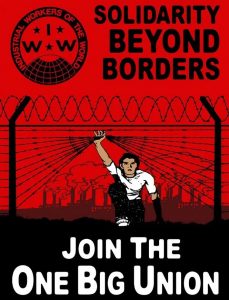
A Union Beyond Borders
The IWW is a union for all those workers who other unions consider undesirable or unorganisable; the most obvious example of this category of workers are migrants. Fellow migrant worker, you are part of a diverse population that constitutes a high percentage of the islands’ workforce. Whether from the European Union 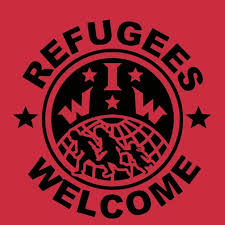 or from a third country, whether with papers or without, whether doing undeclared work or working legally, your contribution to the country’s economic development is as grand as it is undervalued and unappreciated. A quick look at Cyprus’ vital industries – construction, agriculture and tourism – is enough to realize the importance of your work, and the delivery drivers who were hailed as heroes during the weeks of the Covid-19 quarantine, were mostly migrants. All the while you make great financial contributions to the State’s funds through taxation, even as consumer alone; not to mention the robbing of the social security funds of certain categories of temporary migrant workers (see point 7 of Our Program). However, those who are benefited the most by your work – bosses and the political parties who represent their interests – are the first to attack you and blame you for anything under the sun; the employer-owned media are constantly spouting racist propaganda; the government is always busy creating detention centers and implement discriminatory policies. This is not surprising, for it serves the interests of the employing class to keep the workers divided, and they are doing anything in their power not only to keep migrant workers apart from native workers, but also fighting among themselves. Overcome their divide and conquer tactics, see past religious and ethnic differences, and join together as workers to fight for your rights and interests.
or from a third country, whether with papers or without, whether doing undeclared work or working legally, your contribution to the country’s economic development is as grand as it is undervalued and unappreciated. A quick look at Cyprus’ vital industries – construction, agriculture and tourism – is enough to realize the importance of your work, and the delivery drivers who were hailed as heroes during the weeks of the Covid-19 quarantine, were mostly migrants. All the while you make great financial contributions to the State’s funds through taxation, even as consumer alone; not to mention the robbing of the social security funds of certain categories of temporary migrant workers (see point 7 of Our Program). However, those who are benefited the most by your work – bosses and the political parties who represent their interests – are the first to attack you and blame you for anything under the sun; the employer-owned media are constantly spouting racist propaganda; the government is always busy creating detention centers and implement discriminatory policies. This is not surprising, for it serves the interests of the employing class to keep the workers divided, and they are doing anything in their power not only to keep migrant workers apart from native workers, but also fighting among themselves. Overcome their divide and conquer tactics, see past religious and ethnic differences, and join together as workers to fight for your rights and interests.
“The man who seeks to arouse prejudice among workingmen is not their friend. He who advises the white wage-worker to look down upon the black wage-worker is the enemy of both”
Eugene V. Debs (founding member of the IWW)
One Union Against national and religious Division
All labor rights on the island where won by the common struggle of all workers, despite ethnic and religious differences. Those struggles, which begun when Cyprus was a colony, seem long forgotten today, and the ethnic and religious tension cultivated by the divide and conquer strategies still keeps the country and its population apart. This situation does not only serve the geopolitical interests of foreign powers, but also the economical and political interests of the employers’ class. While Cyprus is a country which constitutionally recognizes five different ethnicity and three different religions, and it is the home of tens of thousands of workers from all around the world, its multicultural power and potential are not embraced. The idealistic and hate-filled notions of nationalism keep workers from uniting and building a common future; rampant racism allows for the overexploitation of migrants, which in turn keeps unemployment high and lowers the wages of the entire working population. This situation serves only the bankers and the bosses, and it is not going to be solved by politicians who represent their interests. Workers must build a better tomorrow for themselves, realizing that they have nothing in common with their bosses, whichever their nationality or religion.
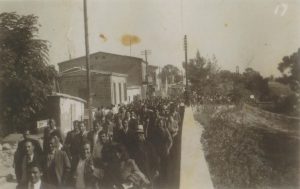
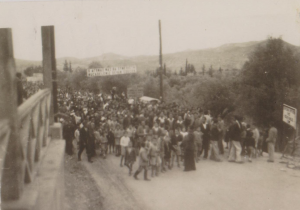
Greek and Turkish Cypriot miners protesting during the strikes of 1948 (P.E.O. archive)
“The true task is to unite and organize all workers on an economic basis, and it is the workers themselves who must secure freedom for themselves, who must grow strong. Nothing can be gained by political action. That is why I became an IWW. (…) I discovered that the true idea of the IWW is not only to better conditions, to get them for all people, but to get them at once.”
Helen Keller (member of the IWW)
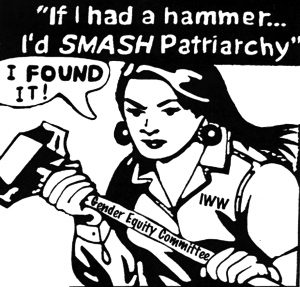
a feminist and LGBTQI+ union
Patriarchy, misogyny, sexism, and gender- and sexual-based violence are a plague on working people, as well as being diametrically opposed to the elevation of the working class; the workplace is often the place where discrimination against women and LGBTQI+ persons is prevalent , and harder to escape when one has to work for a living. Sadly, those social issues are still dominating the Cypriot society, with women having to balance maintaining a household, raising children and working in Cyprus for 14% lower wages than men (for our demands regarding these issues, see points 8 & 9 of Our Program), and the LGBTQI+ community having to face rampant discrimination. Fighting against these social issues must be a priority for the labor movement, not only because those are working class issues, but because workers’ struggles are the most effective way to progress. This fact has long been accepted – look no further than the support “Women Against Pit Closures”, “Gays and Lesbians Support the Miners” and “Lesbians Against Pit Closures” provided to striking miners during the famous 1-year strike against the Thatcher regime – and it is the logic behind the women strikes that are organized on International Workingwomen’s Day (March 8) i
, and harder to escape when one has to work for a living. Sadly, those social issues are still dominating the Cypriot society, with women having to balance maintaining a household, raising children and working in Cyprus for 14% lower wages than men (for our demands regarding these issues, see points 8 & 9 of Our Program), and the LGBTQI+ community having to face rampant discrimination. Fighting against these social issues must be a priority for the labor movement, not only because those are working class issues, but because workers’ struggles are the most effective way to progress. This fact has long been accepted – look no further than the support “Women Against Pit Closures”, “Gays and Lesbians Support the Miners” and “Lesbians Against Pit Closures” provided to striking miners during the famous 1-year strike against the Thatcher regime – and it is the logic behind the women strikes that are organized on International Workingwomen’s Day (March 8) i n more and more countries every year. The IWW has a long history of supporting these struggles; from its earliest days, the IWW accepted women (most unions at the time did not) not only as members, but as key organizers and leaders. Presently, the IWW’s Gender Equity Committee (GEC) supports the struggle for gender equity in our union, workplaces and the world at large. The GEC’s aim is to foster an atmosphere of inclusiveness in the labor movement and the IWW in particular, by seeking out and/or offering resources for peer mediation, conflict resolution, anti-sexism training, literature, consent training, and direct actions to IWW members, because even the IWW can sometimes be the source of gender-based violence and inequity (to get in contact with the GEC see our Contact Directory page).
n more and more countries every year. The IWW has a long history of supporting these struggles; from its earliest days, the IWW accepted women (most unions at the time did not) not only as members, but as key organizers and leaders. Presently, the IWW’s Gender Equity Committee (GEC) supports the struggle for gender equity in our union, workplaces and the world at large. The GEC’s aim is to foster an atmosphere of inclusiveness in the labor movement and the IWW in particular, by seeking out and/or offering resources for peer mediation, conflict resolution, anti-sexism training, literature, consent training, and direct actions to IWW members, because even the IWW can sometimes be the source of gender-based violence and inequity (to get in contact with the GEC see our Contact Directory page).
“The IWW has been accused of pushing women to the front. This is not true. Rather, the women have not been kept in back, and so they have naturally moved to the front.”
Elizabeth Gurley Flynn (leading member of the IWW)
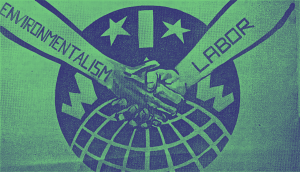
To live in harmony with the Earth
Most scientists agree that the global production processes must undergo radical changes by 2030; if not, the damage to the global environment and the climate changes will not only be severe, but irreversible, and the lower social classes will be the ones facing the worst consequences. Moreover, the top 100 most polluting companies are responsible for more than 70% of global pollution, and the rest is divided among all the other companies and the consumers. As such, it is plain to see that the battle for the planet’s future must be fought mainly in the workplace, against employers and management who are only interested in increasing profits, and against political parties and governments representing the interests of the employing class. The struggle against the destruction of the planet is a struggle against capitalism, and it falls to the workers to fight it efficiently. More and more trade unions are becoming involved in this battle, by organizing industrial action to put pressure on employers, and the IWW is on the front line. Cyprus has a plethora of environmental problems, including forest fires, high pollution, improper waste management etc, and its being plagued by temperatures rising to extremely dangerous levels during the summer; join the IWW, and organize for a cleaner and healthier planet, a planet with a future.
“The Earth is not dying – it is being killed. And the people who are killing it have names and addresses.”
Utah Phillips (member of the IWW)

